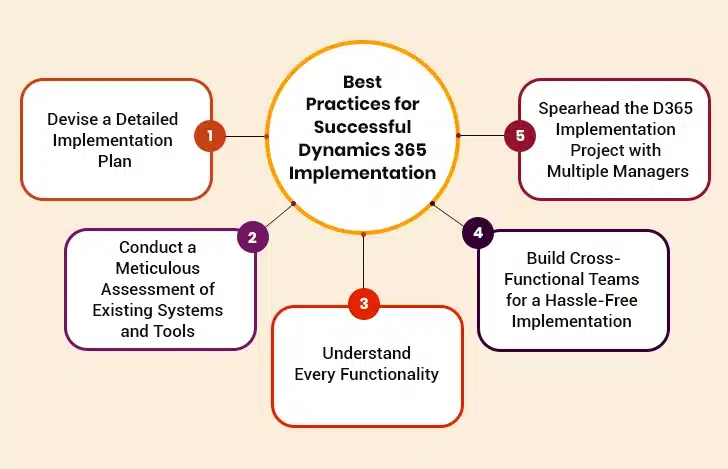Today, organizations both large and small alike are adopting CRM and ERP systems to create a hyper-connected business environment that connects people and processes together to drive more efficiency, reduce costs, improve agility, and accelerate digital transformation. However, nearly two decades of research done by multiple analysts reveals that a significant number of CRM projects fail, in fact, many enterprises have tried to implement CRM two or more times with little to no success.

The numbers are certainly intimidating and indicate the struggle is real for CRM projects since a majority of them fail to gain user adoption. This doesn’t mean that the sales team should switch to traditional methods, such as spreadsheets and email programs for customer segmentation, forecasting sales, anticipating customer needs, building better relationships with customers and prospects, and improving customer retention. Instead, they should adopt Dynamics 365. Dynamics 365 is an enterprise-grade solution engineered by Microsoft to empower businesses in their CRM and ERP initiatives.
If implemented successfully, this cloud-based solution can take businesses to newer heights of success. It can also help them stay at the top of their game. In other words, enterprises need to figure out the most appropriate way for Dynamics 365 implementation to realize the full potential of this robust solution. The good news is that this insightful post breaks down the complex D365 implementation process into clear roadmap/best practices that will help enterprises sail through the challenges that come along the way and set the stage for success. Let’s dive deep into it.
Unlock the ROI of Your CRM

Best Practices for Successful Dynamics 365 Implementation
Step 1: Devise a Detailed Implementation Plan
First things first- chalk out a strategic plan by involving subject matter experts (SMEs), business owners, and other stakeholders to better understand the business workflows, processes, and requirements of cross-functional teams or departments. When devising a plan for D365 implementation, it’s considered wise to begin with evaluating the business process, since this will help enterprises determine whether they need to go with the traditional waterfall technique or adopt an agile approach. A detailed business process assessment is essential for defining the implementation scope, budget, risk management, creating the process flow roadmap, and planning for continuous process improvement. Having clarity on all these aspects helps businesses proceed with a successful D365 implementation and overcome the challenges that come along the way.
Step 2: Conduct a Meticulous Assessment of Existing Systems and Tools
Did you know? One of the key reasons behind the failure of a Dynamics 365 implementation project is the organizations using legacy systems, in-house software or programs coded on decades-old programming languages and frameworks, and partially integrated application suites. Therefore, the first step that enterprises can take to ensure success is documenting all the existing systems, applications, and databases that are integrated within their IT infrastructure. This will help them determine whether these tools and systems can be easily integrated with Dynamics 365 or require some level of modernization to support critical business functions.
Before moving ahead, it is essential to have answers to the following questions:
- Is the IT infrastructure updated?
- Do the existing systems or tools pose any potential security threats?
- Do they create challenges for the workforce to access data sets or files?
- Are there systems and tools that require consolidation to remove data silos?
Step 3: Understand Every Functionality
During the implementation of Dynamics 365, it is likely that businesses may desire to add more modules or features to innovate faster and do more with less. Before implementing new modules or features, it is strongly recommended to revisit all the existing ones since Microsoft rolls out new features and add-ons of Dynamics 365 every now and then. Now, decide on the functionalities catering to the business, industry, and customer needs. If the existing functionalities don’t meet the desired objectives, enterprises may consider either tweaking the “as-is” solution or going for building custom components from scratch.
How Dynamics 365 Can Drive Boost Business Growth
Step 4: Build Cross-Functional Teams for Hassle-Free Implementation
Dynamics 365 successful deployment is not just the responsibility of the implementation partner. Businesses need to build a cross-functional team. The team should have rich prowess in identifying and recognizing bottlenecks, inefficiencies, time gaps, and issues related to quality control. Therefore, when hiring a vendor for D365 implementation, enterprises need to make sure they put together a cross-functional team that is always on their toes for process improvements and suggests possible solutions to deal with potential issues. Having a cross-functional team ensures that every task is completed within the defined timeline and budget. It also makes the D365 implementation more effective.
Step 5: Spearhead the D365 Implementation Project with Multiple Managers
Dynamics 365 implementation is a complex process. It requires a qualified leader who spearheads the project and leverages the expertise of every professional involved in the implementation. To make this happen, the project leader needs to have outstanding communication, project management, and time management skills. This way, they can effectively deal with common bottlenecks and day-to-day issues, follow up with staff, and track progress. Similarly, operation managers need to be good at scheduling, project supervision, and budgeting. However, there are chances that managers with excellent communication and time management skills might not be good at budgeting. The best possible solution to overcome this challenge is to designate two or more leaders who can collectively manage the Microsoft Dynamics CRM implementation project plan.
Key Challenges in Dynamics 365 Implementation and How to Overcome Them
I. Change Management
Adopting Dynamics 365 often disrupts established workflows. This causes resistance among employees. To mitigate this, organizations must clearly communicate the platform’s advantages, such as enhanced collaboration and automated workflows, aligning them with user needs. Involving teams early in the planning phase builds ownership and reduces skepticism.
Additionally, structured training programs tailored to different roles make sure users understand the system’s value. Post-launch support, like dedicated help desks or peer mentors, also drives user adoption and eases the transition.
II. Data Migration
Transferring legacy data to Dynamics 365 poses risks of errors or data loss. Organizations should begin by auditing existing data to identify redundant or inconsistent information. The datasets should be thoroughly cleansed and standardized before migration to ensure accuracy and uniformity. In addition, automation tools should be used for data mapping and validation. These steps can dramatically reduce manual workloads and minimize human error.
Partnering with Dynamics 365 CRM implementation experts adds further safeguards. These professionals design custom data migration plans. These plans prioritize critical datasets like customer records or financial transactions while eliminating redundancies. Their expertise in data governance prevents corruption during transfer.
III. Integration with Existing Systems
Connecting Dynamics 365 with third-party systems demands careful planning. Organizations should start by defining integration goals, such as real-time data synchronization or consolidated reporting. They also need to identify priority data for exchange. Using APIs and middleware helps bridge gaps between platforms. Also, testing the integrations during the early stages identifies and resolves compatibility issues.
Another way to achieve painless integration is by collaborating with certified Microsoft Dynamics CRM implementation consultants. These professionals devise a modular integration strategy that allows scalability. It also helps users adapt to technological changes without overhauls.
How Dynamics 365 Implementation Partners Are Powering the Shift to Intelligent Enterprises
IV. Security and Compliance
Organizations must establish safeguards to ensure compliance and security during Dynamics 365 implementation. Role-based access controls restrict data exposure to authorized personnel. This minimizes internal risks. Additionally, encrypting data prevents unauthorized access. Training employees on security protocols reduces risks of human error, such as mishandling data or falling prey to phishing attacks.
Partnering with Dynamics 365 CRM implementation specialists enhances these efforts. These experts configure advanced security settings. They also enable continuous threat monitoring and ensure alignment with industry standards. This layered approach builds stakeholder trust. It also helps avoid penalties for non-compliance.
How to Choose the Right Dynamics 365 Implementation Partner
Choosing the right Microsoft Dynamics 365 CRM implementation partner is essential for achieving business success. Their expertise ensures smooth CRM deployment and alignment with organizational goals and processes.
1. Assess Expertise Across Dynamics 365 Solutions
Businesses should prioritize partners with experience in multiple Dynamics 365 modules. These include CRM, ERP, Business Central, and legacy systems like Dynamics NAV. Proficiency across these tools makes sure partners understand how to integrate workflows, automate processes, and unify data across departments. For example, a partner skilled in both CRM and ERP can align sales pipelines with inventory management.
A portfolio with projects across industries proves adaptability to unique needs. Partners familiar with varied project scales demonstrate flexibility in resource allocation and problem-solving. Their expertise reduces risks during Microsoft Dynamics CRM implementation. It also ensures solutions stay in line with long-term business goals.
2. Evaluate Customization Capabilities
A strong implementation partner customizes Dynamics 365 to fit a business’s unique workflows and goals. This means adapting features like customer service dashboards to match existing processes. Partners should avoid rigid, one-size-fits-all approaches. They should instead prioritize flexible solutions. For example, a retail company may need order management tailored to seasonal demand.
Modular Dynamics CRM implementations allow businesses to start with priority areas before scaling to other functions. Consultants offering this flexibility ensure the system evolves with the organization. Customization also includes configuring user interfaces, reports, and permissions to align with team roles. Such a tailored approach maximizes efficiency and user adoption.
3. Verify Training and Post-Implementation Support
Effective partners provide role-specific training to ensure users understand how Dynamics 365 applies to their daily tasks. For example, sales teams learn lead management tools, while finance teams master reporting features. This targeted approach boosts confidence. It also reduces resistance to the new system.
Post-implementation support is equally essential. Partners should offer troubleshooting assistance for technical issues. There should be regular system updates to maintain performance. Ongoing optimization refines workflows as business needs evolve, e.g. adding new modules. A dedicated support team ensures minimal downtime. It also improves the platform’s long-term value.
4. Check Certifications and Microsoft Partnerships
It is essential to verify a consultant’s Microsoft certifications. These credentials confirm adherence to Microsoft’s standards and expertise in Dynamics 365. Certified partners undergo rigorous training and audits. This ensures they follow best practices during deployment and support.
Partners with active certifications stay updated on the latest Dynamics 365 features and security protocols. This guarantees access to new tools and compliance updates. Choosing Microsoft-validated partners also ensures direct collaboration with Microsoft’s technical teams. This improves issue resolution speed. Certifications signal reliability, technical depth, and a commitment to delivering solutions that meet industry benchmarks. This reduces implementation risks. It also builds trust in the partner’s ability to meet long-term goals.
5. Review Client Testimonials and Case Studies
Client testimonials offer insights into an implementation partner’s reliability and customer satisfaction. Reading feedback from past clients highlights strengths, such as timely delivery or effective communication, and flags potential weaknesses. Testimonials from businesses in similar industries provide context on how the partner deals with sector-specific challenges.
Case studies demonstrate a partner’s problem-solving abilities. They showcase real-world scenarios, such as streamlining supply chains or migrating complex data. This allows clients to understand their approach to project management and technical expertise. Collectively, testimonials and case studies build a clearer picture of a partner’s abilities. They help assess if the partner can deliver results tailored to unique needs.
6. Ensure Scalability and Future-Proofing
A reliable implementation partner designs Dynamics 365 solutions that grow with the business. Scalable systems adapt to increased transaction volumes, new users, or expanded locations without performance issues. For example, new modules for international compliance should integrate smoothly into the existing setup.
Futureproofing involves anticipating technological advancements. Partners should build flexibility to incorporate new tools as organizational needs grow. A modular architecture allows upgrades without disrupting operations. Avoiding rigid, custom-coded systems prevents costly rebuilds later. Partners who focus on scalability make sure the platform remains relevant and in line with long-term business goals.
The Final Word
As stated above, implementing Dynamics 365 can be challenging. However, a clear roadmap simplifies the process. For added support, partnering with a professional Microsoft Dynamics 365 company is recommended. Experienced partners guide businesses through complexities and enable smooth deployment. Their expertise aligns the system with specific goals and saves time and resources. This collaborative approach leads to successful business outcomes.





